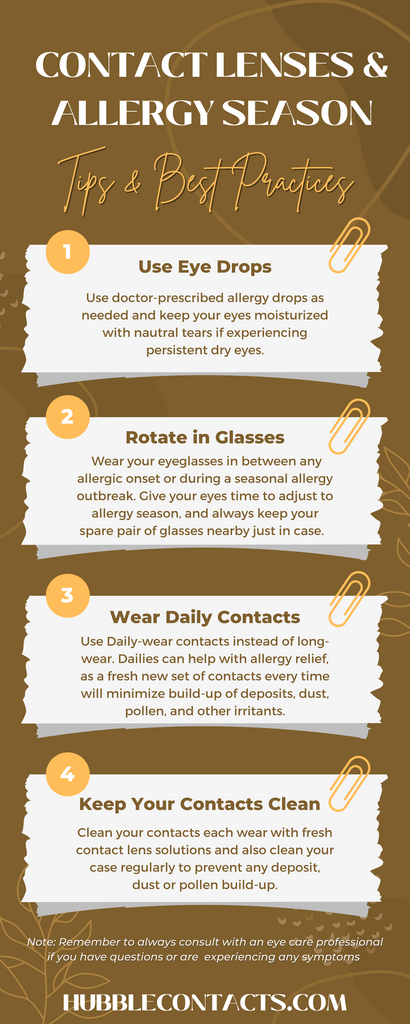Contact Lenses and Allergies: What You Need to Know

Allergy season can be a nuisance when pollen counts are high, and the air is dry and windy. This can cause symptoms such as sneezing, runny nose, and watery or itchy eyes, which can especially affect contact lens users. For those who wear contacts, it is not uncommon for their allergy symptoms, like dry or itchy eyes and redness to be exacerbated by their lens use. However, with some planning and careful practice that includes keeping your contacts free of allergens, you can definitely wear contacts if you have allergies.
Contact lens allergy issues can arise from attracted pollen and other particles from the air, making contact lens wear uncomfortable. Contact lenses are made to be permeable and soft, offering an easy target for dust and pollen to attach onto.
If you are consistent in contact lens care such as regular cleaning of the lens, using fresh contact lens solution, and taking periodic breaks from contacts, you can ease symptoms.
Additionally, there is a small populace who may be allergic to contacts. Being mindful of any reactions early on in contact use will help determine if one is allergic to contact lenses. However, people tend to truly be allergic to the contact lens solution rather than the contacts themselves (this is a rarity, however).
Thankfully, there are other methods for keeping your sight solid during allergy season, including using daily contact lenses as they are less likely to develop deposits and other allergens on the lens itself.
Allergies and Contacts: Can Contact Lenses Cause Allergies?
Contacts are not known to cause seasonal allergies related to pollen count, dust, or other environmental factors. However, there is a rare chance that some contact lens users will develop a condition called Giant Papillary Conjunctivitis (GPC). Like standard conjunctivitis, better known as pink eye, the symptoms presented in GPC mirror that of pink eye (pain in the eye, redness, soreness, severe itchiness).
And while the contact lens may seem like the culprit or cause of GPC, the condition of GPC is actually caused by a preservative ingredient in contact lens solution. When this solution is applied to the contacts, the user may develop eye pain, redness, and itchiness. Additionally, GPC also produces symptoms similar to those shown in pink eye— the main difference is GPC will produce small bumps or lesions under the eyelid.
To treat GPC, making an appointment with an eye doctor is the best solution in order to be properly assessed and examined. In order to avoid long-term damage to the eye or cornea, visiting a doctor will be of the utmost importance. In the meantime, stop using contact lenses in order to not further any potential for damage to the eye until you are able to see a medical professional.
Allergies and Contacts: Can You Be Allergic to Contact Lens Solution?
There is a possibility for contact users to become allergic to the contact lens solution. Given that contact lens solutions is such a routine part of contact care, developing sensitivity to the lens solution is possible. Contact lenses, even though they are a great means of improving vision in a convenient way, are very much a foreign object that is placed in the eye.
If you find that your eyes become itchy or more sensitive, there is marked pain and redness in the eyes, or if there is burning and watering in the eye, make an appointment with your eye care professional. There may be ingredients found in the contact lens solution that can cause a new allergy. There are also contact lens solutions that are thimerosal-free, which could help reduce the possibility of contact lens allergy.
What to Do If Your Contacts or Contact Solution is Causing a Reaction
If you find that your contact lenses and allergies are causing pain or producing a major reaction such as prolonged itching, burning, pain, redness, swelling, or watery eyes, discontinue the use of the contacts immediately. Seek an appointment with an eye doctor for the best plan to alleviate the symptoms. Long-wear lenses can sometimes attract pollutants over time and these irritants can pass through the permeable lens and cause issues down the road. Switching to daily wear contact lenses is recommended to help with keeping your contacts fresh.
Remember that the best eye care is prevention. Be sure to check your contacts to ensure they are free from scratches and damage before placing them in the eye. Never share your contacts or contact cases with others. Be sure that your contact lens solution is not expired and is free from any known allergens and know that Thimerosal-free contact solution is another option to help prevent an allergic reaction. Be sure to stay consistent in these practices to keep your contacts wearable and comfortable for use.
Tips for Wearing Contacts with Allergies
Beyond being allergic to contacts themselves, those who suffer from seasonal allergies can also find their symptoms like red eyes and itchiness exacerbated by contact use. The below information is the best use tips for combatting this issue. These include regulating between contacts and glasses, using eye drops/artificial tears, having a cleaning routine, and consulting with a doctor.
Wear Glasses
Sometimes as a contact lens user when allergies are at their worst, giving your eyes a break from contacts is the best solution. Wear your eyeglasses in between any allergic onset or during a seasonal allergy outbreak. Give your eyes time to adjust to allergy season, and always keep your spare pair of glasses nearby just in case. Also if you find that you have a medical condition of the eye, wearing glasses in the meantime is a good solution to use until you feel better.
Use Eye Drops to Keep your Eyes Moisturized
Use doctor-prescribed allergy drops or over-the-counter eye drops as needed. Keeping your eyes moisturized with natural tears is a way to help with persistent dry eyes. Taking a break from your screens (computer, laptop, cell phone) can help with tired eyes and dryness.
Keep your Contacts Clean
Remember contact lens care 101 which always begins with clean & dry hands before placing in or removing your contacts. And then clean your contacts with each use with a fresh dose of contact lens solution every time. Cleaning your contact case is also key in helping defeat allergens, dust, or particles out of your contacts. If you wear makeup, be sure to put your contacts in first in order to prevent makeup from transferring to the contact.
Wear Daily Contacts
Daily-wear contacts are an attractive option instead of long-wear contacts when you have allergies. Dailies can help with allergy relief, as a fresh new set of contacts every time will minimize build-up of deposits, dust, pollen, and other irritants that make regular contacts more prone to attracting irritants. Also, regardless of the type of contact used, never use a scratched or damaged prescription contact lens. Dispose of and use a new pair instead.
If All Else Fails, Visit a Doctor
If you find that your eye continues to hurt, has prolonged redness, or itchiness, visit your eye care professional. Additionally regular vision or eye exams, and keeping your contact lens prescription up to date will ensure the health of your eyes overall.
Find Your Vision Solution with Hubble Contact Lenses Online
With routine practice that includes consistent care of your contacts and being aware of how to use your contacts, you will be on your way to good vision with Hubble. Try our affordable daily contact lenses online for just $1, and learn about monthly contact subscription services.
At Hubble, we’ve done our homework in sourcing our daily disposable lenses, and the results speak for themselves. Hubble lenses are made from methafilcon A, a hydrogel material with 55% water content, UV protection, and a thin edge—designed for easy insertion, all-day comfort, and crystal-clear vision.
Prescription Contact lenses aren’t for everyone. And even contact wearers like to switch it up every once in a while. Shop Hubble’s selection of handcrafted prescription eyeglasses and you’re bound to find a pair or two you’ll fall in love with. Plus, all our glasses are made from premium materials and feature impact-resistant lenses, durable barrel hinges, and padded temple tips for extra comfort. Regardless of if you go with glasses, contacts, or some combination of the pair, you’ll look good, see better—and feel great.



